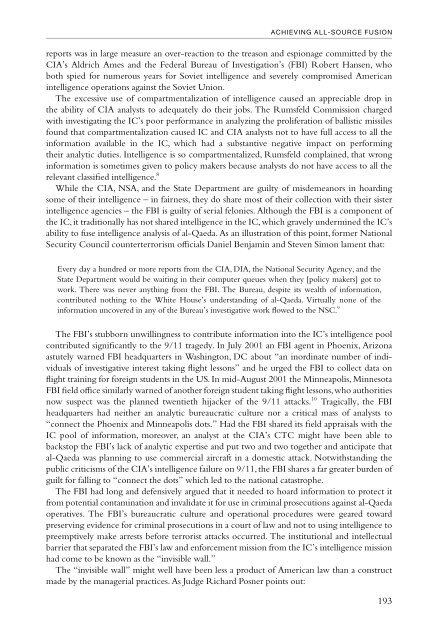Handbook of intelligence studies / edited by
Handbook of intelligence studies / edited by
Handbook of intelligence studies / edited by
Create successful ePaper yourself
Turn your PDF publications into a flip-book with our unique Google optimized e-Paper software.
ACHIEVING ALL-SOURCE FUSION<br />
reports was in large measure an over-reaction to the treason and espionage committed <strong>by</strong> the<br />
CIA’s Aldrich Ames and the Federal Bureau <strong>of</strong> Investigation’s (FBI) Robert Hansen, who<br />
both spied for numerous years for Soviet <strong>intelligence</strong> and severely compromised American<br />
<strong>intelligence</strong> operations against the Soviet Union.<br />
The excessive use <strong>of</strong> compartmentalization <strong>of</strong> <strong>intelligence</strong> caused an appreciable drop in<br />
the ability <strong>of</strong> CIA analysts to adequately do their jobs. The Rumsfeld Commission charged<br />
with investigating the IC’s poor performance in analyzing the proliferation <strong>of</strong> ballistic missiles<br />
found that compartmentalization caused IC and CIA analysts not to have full access to all the<br />
information available in the IC, which had a substantive negative impact on performing<br />
their analytic duties. Intelligence is so compartmentalized, Rumsfeld complained, that wrong<br />
information is sometimes given to policy makers because analysts do not have access to all the<br />
relevant classified <strong>intelligence</strong>. 8<br />
While the CIA, NSA, and the State Department are guilty <strong>of</strong> misdemeanors in hoarding<br />
some <strong>of</strong> their <strong>intelligence</strong> – in fairness, they do share most <strong>of</strong> their collection with their sister<br />
<strong>intelligence</strong> agencies – the FBI is guilty <strong>of</strong> serial felonies. Although the FBI is a component <strong>of</strong><br />
the IC, it traditionally has not shared <strong>intelligence</strong> in the IC, which gravely undermined the IC’s<br />
ability to fuse <strong>intelligence</strong> analysis <strong>of</strong> al-Qaeda. As an illustration <strong>of</strong> this point, former National<br />
Security Council counterterrorism <strong>of</strong>ficials Daniel Benjamin and Steven Simon lament that:<br />
Every day a hundred or more reports from the CIA, DIA, the National Security Agency, and the<br />
State Department would be waiting in their computer queues when they [policy makers] got to<br />
work. There was never anything from the FBI. The Bureau, despite its wealth <strong>of</strong> information,<br />
contributed nothing to the White House’s understanding <strong>of</strong> al-Qaeda. Virtually none <strong>of</strong> the<br />
information uncovered in any <strong>of</strong> the Bureau’s investigative work flowed to the NSC. 9<br />
The FBI’s stubborn unwillingness to contribute information into the IC’s <strong>intelligence</strong> pool<br />
contributed significantly to the 9/11 tragedy. In July 2001 an FBI agent in Phoenix, Arizona<br />
astutely warned FBI headquarters in Washington, DC about “an inordinate number <strong>of</strong> individuals<br />
<strong>of</strong> investigative interest taking flight lessons” and he urged the FBI to collect data on<br />
flight training for foreign students in the US. In mid-August 2001 the Minneapolis, Minnesota<br />
FBI field <strong>of</strong>fice similarly warned <strong>of</strong> another foreign student taking flight lessons, who authorities<br />
now suspect was the planned twentieth hijacker <strong>of</strong> the 9/11 attacks. 10 Tragically, the FBI<br />
headquarters had neither an analytic bureaucratic culture nor a critical mass <strong>of</strong> analysts to<br />
“connect the Phoenix and Minneapolis dots.” Had the FBI shared its field appraisals with the<br />
IC pool <strong>of</strong> information, moreover, an analyst at the CIA’s CTC might have been able to<br />
backstop the FBI’s lack <strong>of</strong> analytic expertise and put two and two together and anticipate that<br />
al-Qaeda was planning to use commercial aircraft in a domestic attack. Notwithstanding the<br />
public criticisms <strong>of</strong> the CIA’s <strong>intelligence</strong> failure on 9/11, the FBI shares a far greater burden <strong>of</strong><br />
guilt for falling to “connect the dots” which led to the national catastrophe.<br />
The FBI had long and defensively argued that it needed to hoard information to protect it<br />
from potential contamination and invalidate it for use in criminal prosecutions against al-Qaeda<br />
operatives. The FBI’s bureaucratic culture and operational procedures were geared toward<br />
preserving evidence for criminal prosecutions in a court <strong>of</strong> law and not to using <strong>intelligence</strong> to<br />
preemptively make arrests before terrorist attacks occurred. The institutional and intellectual<br />
barrier that separated the FBI’s law and enforcement mission from the IC’s <strong>intelligence</strong> mission<br />
had come to be known as the “invisible wall.”<br />
The “invisible wall” might well have been less a product <strong>of</strong> American law than a construct<br />
made <strong>by</strong> the managerial practices. As Judge Richard Posner points out:<br />
193
















